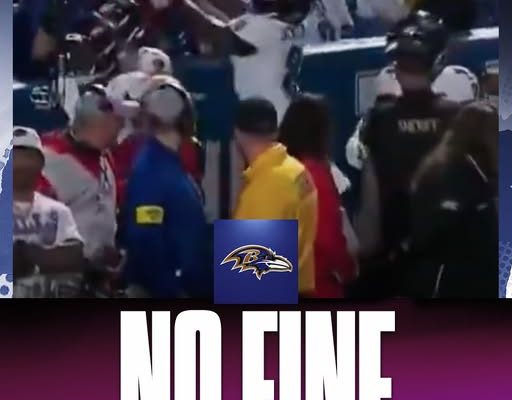Lamar Jackson, the dynamic quarterback for the Baltimore Ravens, found himself at the center of controversy following an incident with a Bills fan during Sunday night’s game, but the NFL has confirmed that there will be no sanction against him. The league, through official spokesperson Brian McCarthy, stated that “the matter has been addressed by the club and there is no further action from the league.” While the incident drew significant attention on social media and in sports news outlets, the decision not to penalize Jackson underscores the league’s judgment that the situation was either adequately managed by the Ravens internally or did not warrant additional intervention. This resolution raises questions about player safety, fan interaction, and the boundaries of behavior on and off the field, all of which have become increasingly important topics in professional sports.
According to the Ravens, the organization handled the incident internally, prioritizing the safety and well-being of their players. A Ravens official emphasized, “Our player’s safety is of the utmost importance. We have spoken to Lamar, who understands the impact of the situation, about the incident. While we will keep internal matters private, we have implemented additional security protocols—both at home and on the road—to better protect our players and handle negative fan interactions moving forward.” This statement highlights the dual concerns that NFL teams face: protecting their athletes from potential harm while also maintaining a safe and professional environment during games. Player-fan interactions have long been a delicate issue, especially in high-stakes games or high-profile matchups, and this incident illustrates the challenges teams must navigate in real time.
Jackson’s altercation occurred in a high-pressure, emotionally charged environment, which is not uncommon in professional sports. Players are constantly under intense scrutiny, both from fans in the stands and viewers watching at home, and the emotions of the moment can sometimes result in confrontations. In this case, the incident did not escalate to a level that required league intervention, suggesting that the Ravens’ internal handling was sufficient. The league’s decision to forgo a sanction can also be seen as an acknowledgment of the complexity of these situations, where context, player intent, and immediate management all factor into determining the appropriate course of action.
The NFL has established policies regarding player conduct, particularly when it comes to interactions with fans. These policies are designed to protect both players and spectators, but enforcement can be nuanced. The league’s assessment likely considered factors such as Jackson’s prior conduct, the nature of the altercation, and the steps taken by the Ravens to address the matter immediately. By choosing not to issue a sanction, the NFL is signaling that not every incident of this nature rises to the level of a disciplinary issue, particularly when the team has proactively intervened.
Security measures for players have become an increasingly important aspect of the NFL in recent years. With high-profile athletes like Jackson, who are often targets for fan attention or verbal confrontations, teams must take extra precautions to ensure safety. The Ravens’ statement about implementing additional security protocols suggests that they are taking a proactive approach, likely including increased personnel in areas where players are most vulnerable, enhanced monitoring of fan behavior, and perhaps even adjustments to stadium access or seating arrangements. Such measures are intended to reduce the likelihood of similar incidents in the future, while also reassuring players that their safety is being taken seriously.
From Jackson’s perspective, the resolution of this incident without a league sanction is likely a relief. Players are acutely aware of the implications that disciplinary action can have, not only on their public image but also on their playing status and financial considerations. A sanction could have included fines, suspensions, or other forms of punishment, all of which could impact the Ravens’ performance on the field. By having the matter resolved internally, Jackson can focus on his responsibilities as a quarterback and continue to lead his team without the distraction of league-imposed consequences.
Fan behavior in professional sports has been a topic of increasing concern in recent years. While most spectators act responsibly, there are instances where emotions run high, leading to confrontations with players. Leagues and teams have had to grapple with how to balance fan access and engagement with the need to protect athletes. The NFL has developed a framework for managing these interactions, including rules about ejections, bans for disruptive fans, and other measures to ensure that games remain safe and enjoyable for everyone involved. Jackson’s incident serves as a reminder of why these policies are necessary and why teams must remain vigilant.
The decision not to penalize Jackson also raises broader questions about accountability and the standards applied to players in professional sports. Fans and media often debate whether athletes are held to a higher standard of conduct, particularly in high-pressure situations where emotions can run high. In this case, the league appears to have weighed the circumstances carefully, considering both Jackson’s intentions and the immediate actions taken by the Ravens. The outcome suggests that the league recognizes the human element in these interactions and is willing to defer to the team’s judgment when appropriate.
Media coverage of the incident reflected the intensity of interest in Jackson as a player and a public figure. As one of the most dynamic quarterbacks in the league, Jackson draws significant attention both for his on-field performance and for his personality off the field. News outlets and social media platforms quickly reported on the altercation, analyzing video clips, fan reactions, and expert commentary. While some critics called for disciplinary action, others emphasized the importance of context and noted the league’s precedent for handling similar situations internally. This wide-ranging coverage illustrates the scrutiny that top athletes face and the challenges they encounter in maintaining professionalism in all interactions.
The Ravens’ approach to handling the incident internally is consistent with the trend among NFL teams to take greater responsibility for player conduct and safety. By addressing the situation immediately, the organization not only mitigates potential escalation but also demonstrates a commitment to its players’ well-being. Internal investigations and proactive interventions allow teams to tailor responses to specific situations, taking into account the personalities involved, the environment, and the potential impact on team dynamics. This approach can be more effective than a one-size-fits-all league mandate, particularly in cases where nuance and context are critical.
Jackson’s status as a high-profile athlete also underscores the need for clear communication and education around player-fan interactions. Teams often provide guidance and protocols to help players navigate encounters with fans, including how to de-escalate situations, seek security assistance, and maintain composure in heated moments. These resources are intended to protect both players and fans while preserving the integrity of the game. Jackson’s experience may serve as a case study for future players, highlighting best practices for handling confrontational scenarios.
The broader implications of this incident extend beyond the Ravens and Jackson himself. Leagues across professional sports are increasingly focused on safety, accountability, and the management of public interactions. Incidents like this one highlight the delicate balance that must be maintained between fan engagement and player protection. The NFL’s decision not to impose a sanction, coupled with the Ravens’ internal measures, reflects a recognition that proactive management, rather than reactive punishment alone, is a key component of maintaining safe and professional environments in sports.
Fan reaction to the incident has been mixed, with some expressing concern over the behavior and others emphasizing the need for understanding and context. The debate touches on broader societal themes, including expectations for public figures, the role of security personnel, and the responsibilities of fans in a highly charged atmosphere. By handling the situation internally and communicating their commitment to player safety, the Ravens have signaled that they take these concerns seriously while also supporting their player.
Jackson’s role as a team leader also adds another layer of consideration. Quarterbacks are often viewed as the face of their franchises, and their conduct can influence team culture and public perception. By addressing the incident promptly and implementing additional security measures, the Ravens not only protect Jackson but also set an example for the team as a whole. Maintaining composure and professionalism in challenging situations reinforces the standards expected of all players and helps cultivate a culture of accountability and respect.
In conclusion, Lamar Jackson’s altercation with a Bills fan on Sunday night, while drawing significant attention, will not result in a sanction from the NFL. The league has deferred to the Ravens’ internal handling of the matter, emphasizing that the situation has been addressed and no further action is required. The Ravens have highlighted their commitment to player safety, implementing additional security protocols and providing guidance to ensure that similar incidents are managed effectively in the future. The decision underscores the complexity of player-fan interactions, the importance of context in evaluating conduct, and the growing emphasis on proactive safety measures within professional sports. For Jackson, the resolution allows him to focus on his performance and leadership responsibilities on the field, while also highlighting broader issues around player safety, accountability, and the evolving dynamics of fan engagement in the NFL. The incident, the league’s response, and the Ravens’ actions collectively demonstrate how teams and leagues can navigate challenging situations with a combination of discipline, care, and strategic foresight.



